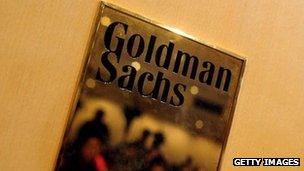The going rate for Goldman
- Published
- comments

Goldman has been bailed out by US taxpayers in the past
There seems to be a prevailing view that it is little short of scandalous that Goldman Sachs in the UK may defer the handing over of shares to its executives, so that they would be liable to next year's income tax rate of 45% on the payments rather than this year's 50% (see this morning's FT, external for more on this).
Given the size of Goldman's historic bonus pools, the value of these shares would certainly run to tens of millions of pounds, and probably to hundreds of millions of pounds, so the tax saving would not be trivial - perhaps double digit millions of pounds (Goldman won't confirm the quantum).
To be clear, what Goldman is considering in this case is not opaque and highly complex tax planning, designed to bamboozle the tax man. It is not sophisticated tax avoidance, or financial engineering of the sort - arguably - that too many banks and bankers have indulged in.
The global investment bank is contemplating delaying for a few weeks the handing over of shares to staff that they were awarded in 2009, 2010 and 2011 but have not received yet.
This kind of adjustment of payment schedules is neither unusual nor confined to bankers: it is being contemplated right now by all manner of businesses, big and small, as the top-rate income tax cut looms; if that weren't the case, then the basic rules of business behaviour would have been rewritten.
So the noise around Goldman raises two interesting questions.
First, do we now expect a higher standard of behaviour from banks than from other businesses, such as architects or law firms or those in private medicine?
That might be a reasonable expectation, given that big banks such as Goldman have been bailed out by taxpayers in the past and doubtless will be again (for all the current spate of reforms designed to cut them free).
If banks benefit from permanent state protection against collapse, then perhaps we need to make explicit that there is a contract between banks and state that they should never ever take steps to reduce their tax burden.
On the other hand, if Goldman is too big to fail, it is US taxpayers - rather than British ones - that are its main underwriters.
Second, is there a new rule of good corporate citizenship that any business or business person should pay the highest prevailing rate of tax possible, even if there is an easy and legal way of paying less tax?
Apparently when David Cameron had one of his regular meetings with business leaders on Friday, he told the assembled corporate eminences that they had a moral duty to ensure their companies paid the full corporation tax rate, given that the government has been cutting that rate and continues to do so.
According to one multinational boss, he was in essence saying that paying corporation tax is a part of a business's corporate social responsibility (CSR).
This carries two perhaps unfortunate implications.
First is that the prime minister appears to feel more or less powerless to use much more than moral suasion to ensure the biggest, most internationally mobile companies pay the going rate.
And if paying tax is part of CSR, then the public sector is being characterised - in essence - as a charitable good cause.